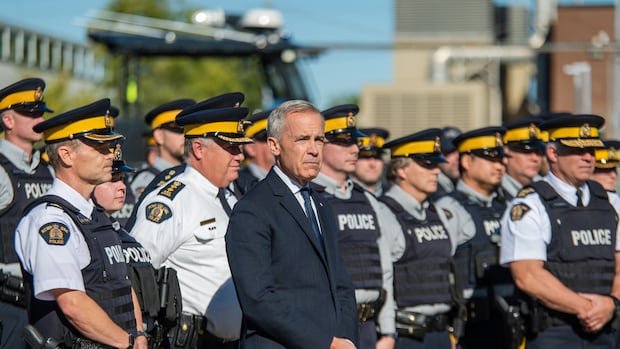Carney says legislation to toughen sentences, make bail harder coming next week

Prime Minister Mark Carney says his Liberal government will introduce legislation next week to crack down on crime by bringing in harsher sentencing and making bail much harder to get.
The announcement is part of the law and enforcement agenda Carney introduced in his spring election campaign and includes a promise to hire 1,000 new RCMP officers.
“The minister of justice will be tabling legislation next week with strong reforms on bail and sentencing,” Carney said. “We're getting violent criminals and repeat offenders off the streets.”
The Conservatives have been pushing for bail reform for years, arguing the current system is little more than a revolving door that allows those with lengthy criminal records to be free while awaiting trial.
Carney said the forthcoming legislation will see repeat offenders who have been charged with home invasions, violent car theft, assault, sexual assault, extortion or human trafficking have to prove they deserve bail before it is awarded.
Imposing that “reverse onus” is different from the current system, where prosecutors have to prove that denying someone bail is justified.

“Canada’s new government will also toughen sentences for repeat offenders of auto theft, of organized crime and of home invasions, so that criminals who have repeatedly victimized your community do not have the chance to do so again,” Carney said.
The legislation will allow courts to impose consecutive sentencing for violent and repeat offenders.
Consecutive sentencing and the Supreme CourtA sentencing provision introduced in 2011 by Stephen Harper's Conservative government gave judges discretion to hand out consecutive, 25-year blocks of parole ineligibility in cases where an offender has committed multiple first-degree murders.
That meant if someone was convicted of six murders, they would not be eligible for parole for 150 years.
But the provision was ruled unconstitutional by the Supreme Court of Canada in 2022, which said consecutive periods of parole ineligibility "are intrinsically incompatible with human dignity because of their degrading nature."
When asked how he would ensure that enshrining consecutive sentencing in law would withstand a legal challenge, Carney said his government met with constitutional experts, police forces and justice ministers across the country to ensure this legislation is viable.
“This is a package that we expect … does what it's supposed to do; it toughens the rules, it punishes criminals, it will help keep us safe, but also is consistent with the Charter of Rights and Freedoms,” he said.
The prime minister also announced that the legislation will remove conditional sentencing for people convicted of sexual offences, preventing them from serving sentences at home or in the neighbourhoods where they committed their crimes.
The Conservatives dismissed Carney’s announcement, saying that they had proposed the Jail Not Bail Act (Bill C-242) in September — and the government should pass their legislation instead.
“It’s time to repeal the Liberal hug-a-thug policies that have endangered Canadians and tipped the scales of justice in favour of criminals,” the party said in a statement Thursday. “Only Conservatives will scrap Liberal bail, make our streets safe and deliver a justice system that puts victims' rights first.”
Carney’s promise to hire 1,000 new RCMP personnel over four years will cost $1.8 billion. It will also raise the RCMP cadet recruitment allowance to $1,000 per week and fund 150 new RCMP personnel to combat financial crimes, like money laundering, online fraud and the recovery of illegally obtained assets.
cbc.ca





